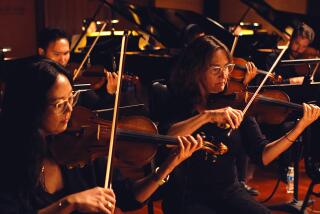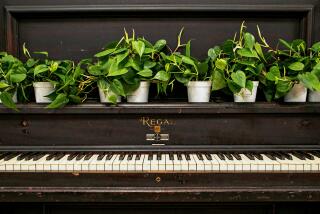Grand Sounds From Tiny Toys
- Share via
Twenty minutes remained before their scheduled performance. Scott Paulson and Linda Kernohan quickly navigated a dolly loaded with blanketed instruments among the curious already congregating in the second-floor rotunda of the UCLA College Library. After a speedy setup, Paulson cued his partner to begin. Sitting cross-legged on the floor, Kernohan leaned over the keys of a baby-sized black baby grand and struck the first note.
They were making music, real music, but on tiny toy pianos. And the whimsical, chime-like tones filling the rotunda were resonating clues that these two are serious about making music fun.
Paulson and Kernohan were performing on toy pianos as part of an educational outreach effort sponsored by UC San Diego’s Geisel Library, named for Theodor Geisel, a.k.a. Dr. Seuss.
Always searching for innovative, nonthreatening ways to introduce people to music, Paulson, a professional oboist who works at the library’s listening desk (and is UC San Diego’s carillonneur), created the Short Attention Span Music series. The series consists of free, 15-minute concerts offered at libraries and schools throughout Southern California. He often performs with Kernohan, a graduate student in composition in UC San Diego’s music department.
Although the concerts began by featuring standard instruments, Paulson eventually turned to toys.
“People are often afraid of new music, but who can be afraid of a toy piano?” he asked.
Apparently no one. He has been overwhelmed by the response to his toy piano concerts and now actively seeks and commissions scores for the instrument on behalf of the library’s newly established toy piano collection, another of his brainstorms.
In the age of the electronic keyboard and computer-generated orchestrations, the attraction to a 127-year-old toy is surprisingly genuine. Maybe we’re fascinated by the unexpected possibilities created with a child’s plaything. Or maybe it’s a comfort sound--a musical, Schroeder-styled memory from our childhood. Whatever it is, it sells.
Margaret Leng Tan, a pianist known for her forays into the avant-garde, plays her toy instruments to sold-out crowds around the world. A Julliard graduate, Leng Tan said she tired of being “just” a classical pianist. So for almost 20 years, she has experimented with the toy piano. Her legitimization of what is essentially a child’s toy is another step in this musical exploration. (A couple of years ago, she dubbed one of her concerts “An Ode to Schroeder: A One-Woman Monster Toy Piano Event.”)
“I never thought the interest in the toy piano would escalate to the level that it has, but the enthusiasm has not died down,” says Leng Tan, whose CD, “The Art of The Toy Piano” (Point Music, 1997), includes selections from Beethoven to the Beatles. “It’s charming. It reeks of nostalgia, but it’s not a gimmick. People take me seriously because they see a level of artistic achievement worth paying attention to.”
She practices on her toy pianos, toy accordions and toy drums five hours a day in her Brooklyn apartment. On stage, she plays her three-octave concert grand with her left hand and her spinet with her right, generating tremendous range from keyboards with no more than 37 keys. (A full-size piano has 88.)
For most owners of toy pianos, the instruments are toys, with the majority of new compositions being plucked out by the 6-and-under set. The American-made Schoenhut toy pianos, considered the best in a very small industry, begin at about $80, with higher-end models like the 2 1/2-octave baby grand selling in specialty toy shops and upscale catalogs such as Hammacher Schlemmer for about $170. According to Schoenhut Piano Co. President Renee Trinca, grandparents are some of their best consumers, seeking that classic toy just like the one they had when they were children.
Forty-one-year-old Paulson remembers the day his parents gave him his first Schoenhut toy piano--it was just last year.
*
A Short Attention Span concert is scheduled in the children’s literature department of the Los Angeles Public Library, 630 W. 5th St., at 11 a.m. Nov. 16. Information: (213) 228-7250.
More to Read
The biggest entertainment stories
Get our big stories about Hollywood, film, television, music, arts, culture and more right in your inbox as soon as they publish.
You may occasionally receive promotional content from the Los Angeles Times.










